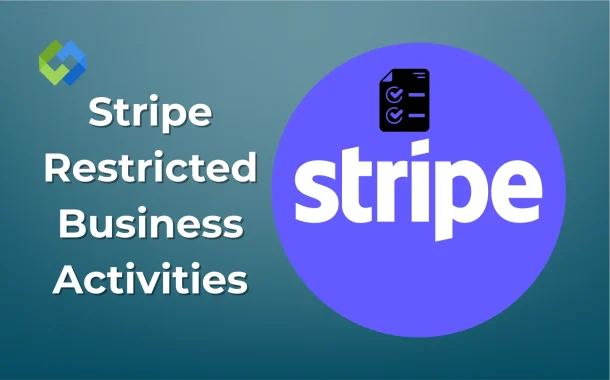It’s important to read Stripe’s rules before using it. If you don’t follow the rules, your account may get closed suddenly. This can affect your payments and hurt your business. Knowing the restrictions helps you avoid problems and find other payment options early.
Table of Contents
Table of Contents
What Are Stripe’s Restricted Business Activities
Stripe has a strict policy when it comes to the types of businesses it allows. Some businesses are restricted or even completely banned from using Stripe’s services. These are usually high-risk industries or those that involve legal concerns. Stripe follows global regulations and works with banks, so it must limit certain activities to stay compliant.
Restricted business activities include things like selling illegal drugs, weapons, adult content, gambling, and counterfeit products. Some financial services like cryptocurrency exchanges or investment platforms are also restricted. Even if your business is legal in your country, Stripe might still block it due to global rules or partner limitations.
In some cases, Stripe may allow a restricted business if you get special approval. But this depends on the country, the risk involved, and how your business operates. Stripe reviews these on a case-by-case basis. You’ll need to contact Stripe support and provide full details.
Categories of Prohibited and Restricted Businesses
Financial and Investment Services
Stripe restricts businesses that deal with unlicensed or high-risk financial services. This includes cryptocurrency exchanges, credit repair services, money transfer operations, and investment platforms without proper regulation. These services carry legal and fraud risks, which is why Stripe avoids them unless strictly compliant with financial laws.
Illegal Products or Services
Any business offering illegal or banned items is not allowed on Stripe. This includes counterfeit goods, unlicensed pharmaceuticals, fake documents, or services that promote crime. Even if the business operates in a legal gray area, Stripe will reject it to stay within global law standards.
According to Daoud Legal, Sydney Criminal Defence Lawyers, “criminal law makes it clear that dealing in illegal goods or services carries serious penalties, and businesses must take compliance seriously to avoid legal and financial consequences.“
Gambling and Gaming
Online gambling platforms, sports betting sites, and lottery ticket resellers are generally prohibited. Even games of skill or chance that offer real-money prizes may be restricted. These activities involve legal complexities and high chargeback rates, making them risky for Stripe to process.
Regulated Goods and Services
Products like firearms, ammunition, vaping products, and tobacco are highly controlled by law. Stripe avoids processing payments for such businesses due to licensing issues and compliance risks. Even accessories related to these goods can lead to account suspension.
Intellectual Property Violations
Selling pirated or stolen content is not allowed. This includes fake branded products, illegal software downloads, and unauthorized streaming services. Stripe protects copyright laws and bans businesses that misuse intellectual property for profit.
Why Stripe Restricts Certain Businesses
Stripe restricts certain businesses to reduce financial and legal risks. It handles money through banks and card networks, so it must follow strict rules. If a business is seen as risky, illegal, or likely to cause chargebacks, Stripe blocks it. This protects the platform and other users from fraud or misuse.
Many restricted businesses deal with areas like gambling, unlicensed financial services, or counterfeit goods. These industries often face legal issues and bring a higher chance of disputes. Stripe avoids them to keep its system stable and its reputation clean.
Stripe also operates in many countries. What’s legal in one country may be banned in another. To stay compliant worldwide, Stripe uses a strict global policy. This means some businesses may be rejected even if they follow local laws.
Check If Your Business Is Allowed
Before signing up with Stripe, you should always check if your business is allowed. Stripe has a detailed list of restricted and prohibited business types on its official website. Go through that list carefully. If your business offers anything high risk or regulated, it might fall under those restrictions.
Some industries like gambling, investments, or selling tobacco often need extra checks. Even if your business seems legal in your country, Stripe may still block it based on global rules. That is why it is important not to assume. Always verify first by reviewing Stripe’s policies.
If you are unsure, reach out to Stripe support. Explain what you sell and how your business works. They might ask for your website or documents to review. It is better to be upfront than risk having your account closed later.
What Happens If You Violate Stripe’s Restrictions
If you violate Stripe’s business restrictions, your account can be suspended or permanently closed. Stripe takes these rules seriously to protect its platform and partners. Once a violation is found, Stripe may stop all payment processing and hold your funds. This can happen without warning, especially if the business activity is clearly prohibited.
In most cases, Stripe will send you a notice explaining the issue. They may give you a chance to respond or submit more details. However, not all accounts are given the opportunity to appeal. Stripe might also block future access to its services, making it hard to reopen or create a new account.
The funds in your account may be held for up to 90 days, depending on the situation. This is done to cover possible refunds or chargebacks. To avoid these problems, always check Stripe’s rules before starting. Staying within the guidelines keeps your payments running smoothly.
Conclusion
Stripe is a powerful and trusted payment platform, but it does not support every type of business. It has strict rules to reduce risk, follow legal requirements, and protect its partners. If your business falls under a restricted category, you may face account suspension or blocked transactions.
Before using Stripe, always check their list of prohibited activities. If you are unsure, contact their support team. This simple step can help you avoid major payment issues later. Running a Stripe-approved business keeps your payments smooth and your account safe.














